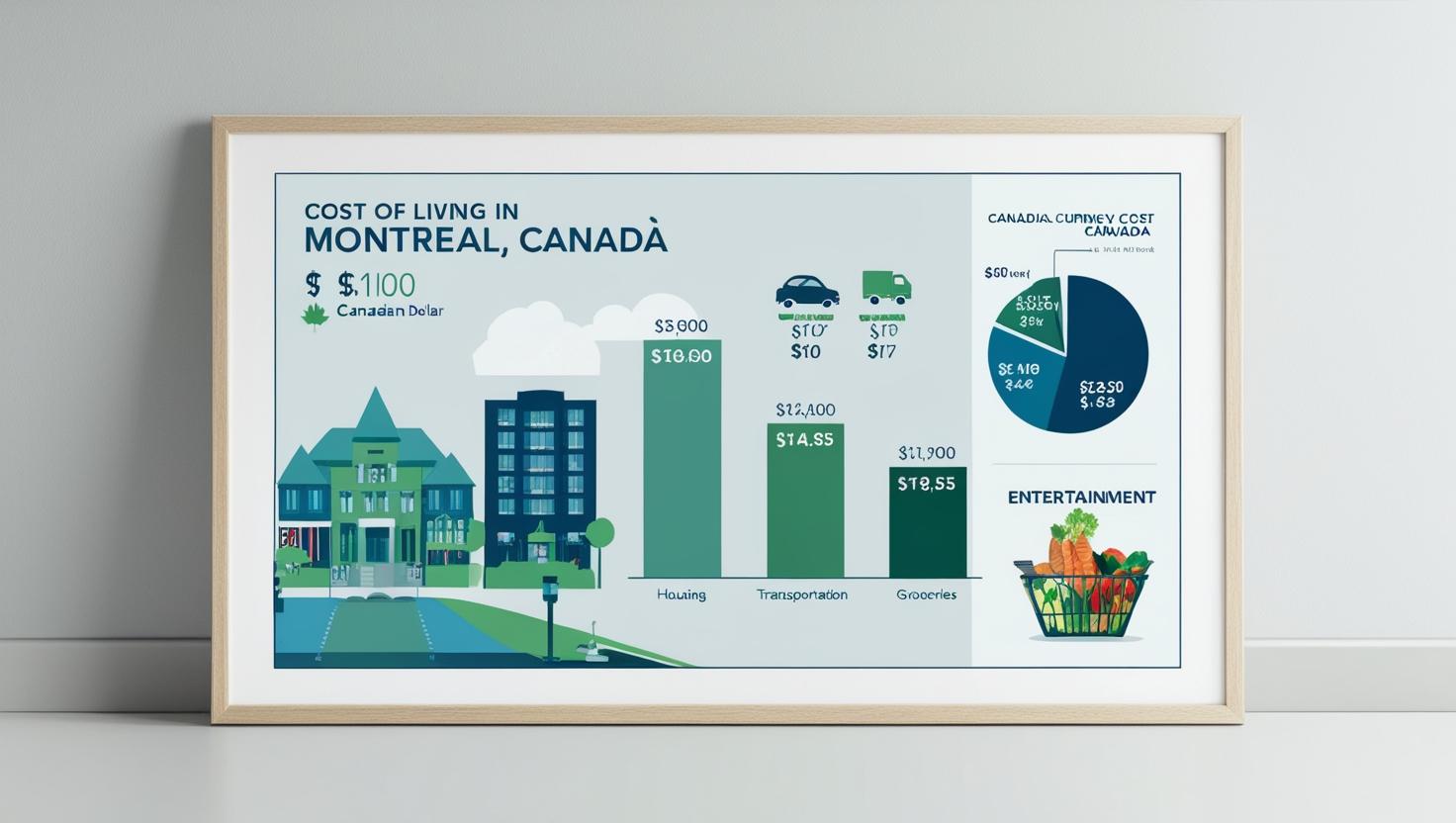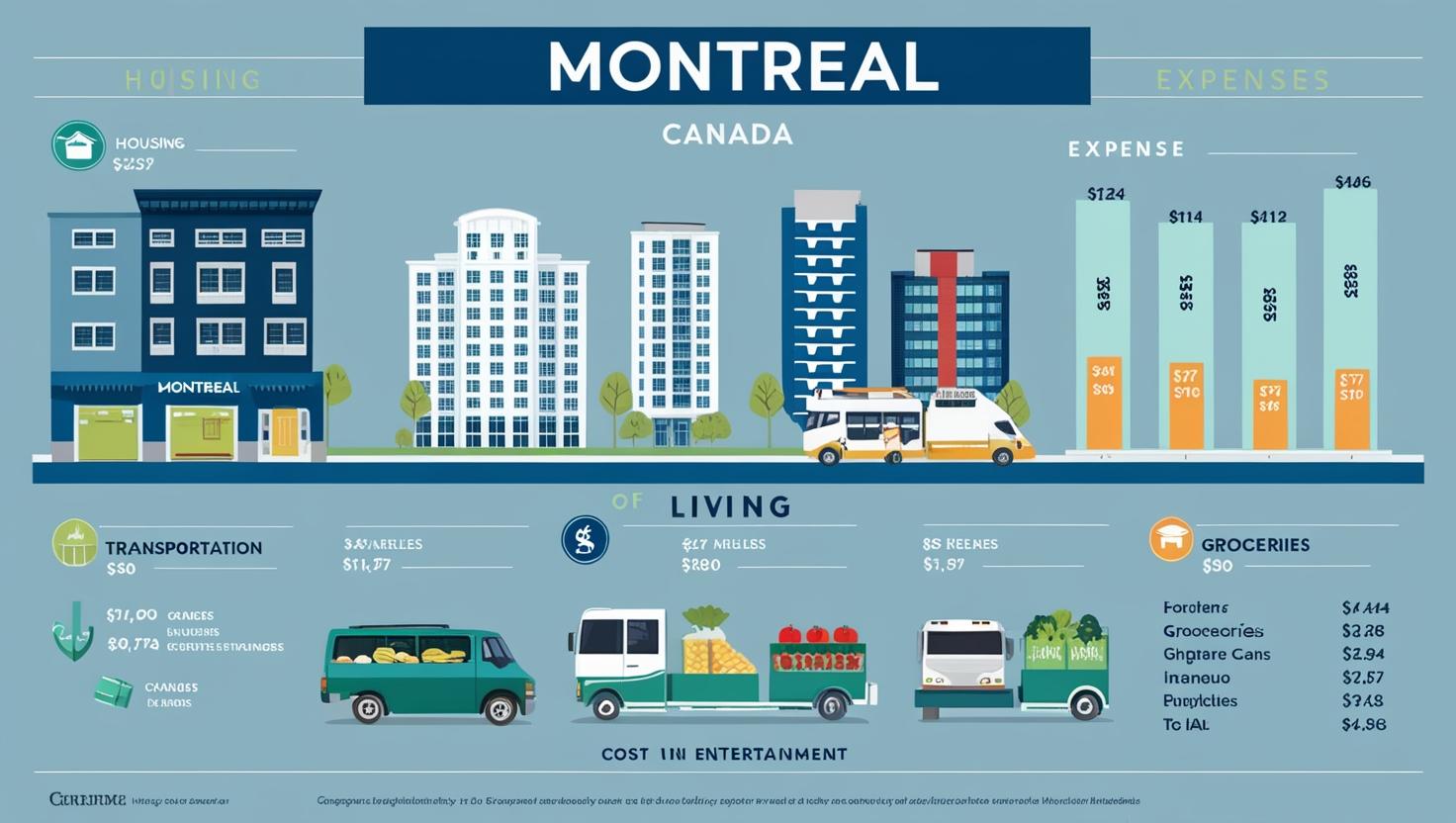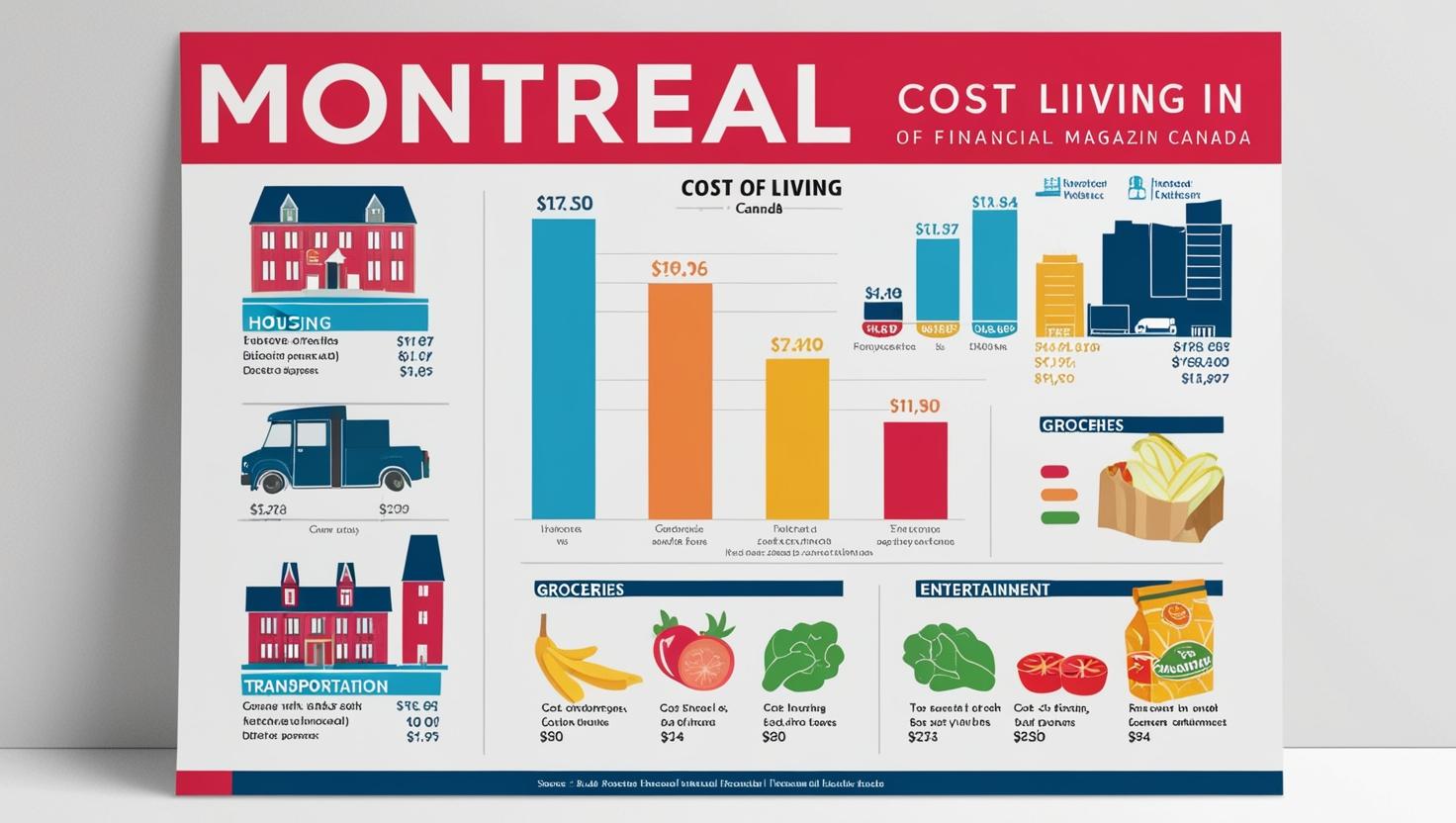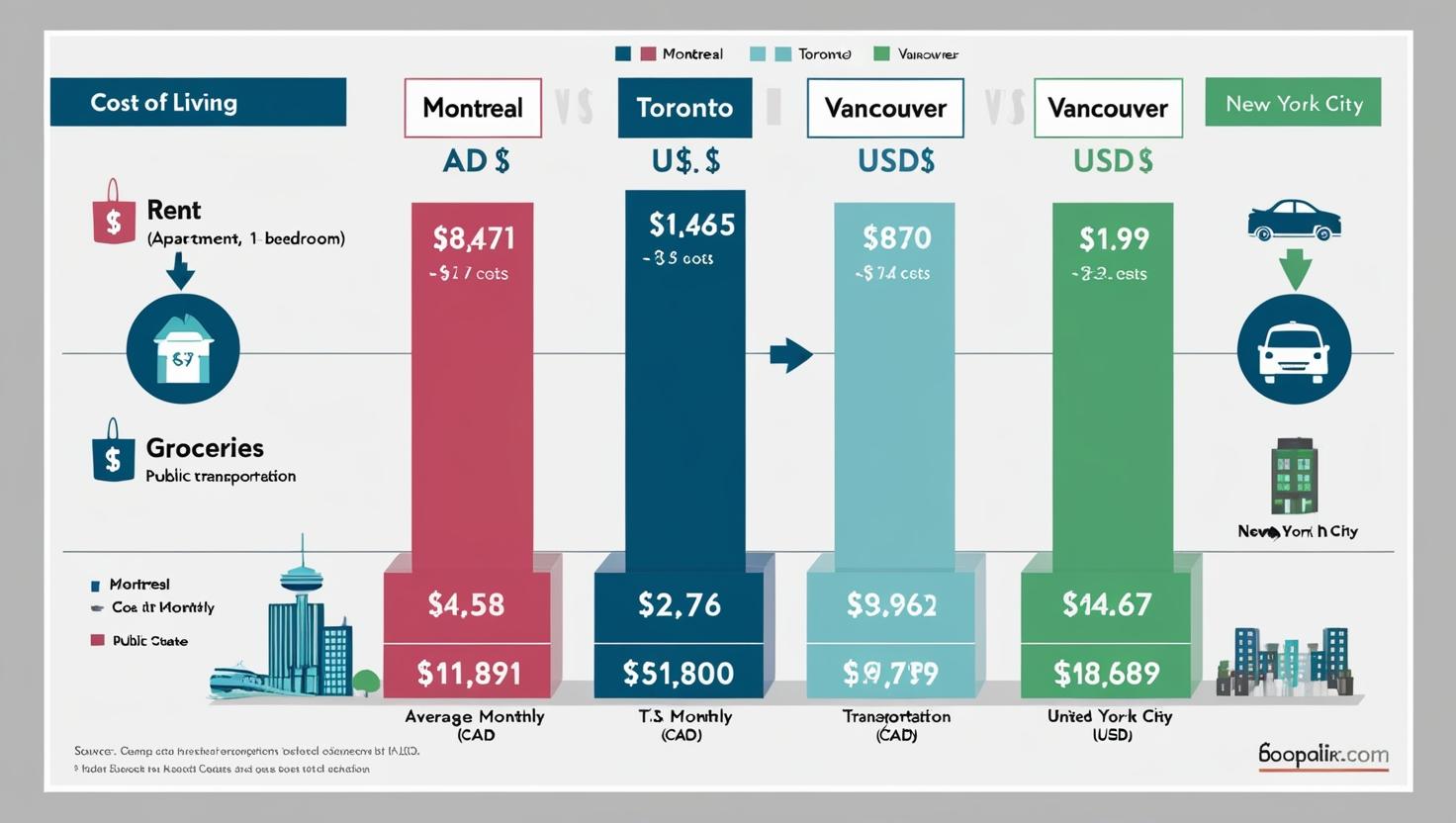Comprehensive Guide Montreal Currency Cost of Living 2024

If you’re thinking about moving to Montreal, you’re not alone. With its rich culture, welcoming atmosphere, and affordable lifestyle, Montreal is quickly becoming one of Canada’s most popular cities to live in. Whether you’re a student, expat, or remote worker, understanding the financial side of living here is key to a smooth transition.
One major factor to consider is the Montreal currency cost of living. Montreal uses the Canadian Dollar (CAD), which tends to offer better value than currencies in more expensive cities like Toronto or Vancouver. From rent and groceries to daily transit and entertainment, knowing how the local currency affects your spending will help you budget wisely and avoid surprises.
This guide covers everything you need to know about living costs in Montreal in 2024. You’ll get detailed insights on housing, food, transportation, utilities, healthcare, education, and more. By the end, you’ll see why Montreal is not only vibrant and diverse, but also one of the most budget-friendly big cities in Canada.
2: What Currency Does Montreal Use?
Montreal uses the Canadian Dollar (CAD), often marked as “C$” or just “$”. If you’re visiting from the U.S., Europe, or the UK, keep an eye on the exchange rate for USD, EUR, or GBP to CAD. Based on expert insights and financial best practices, use apps like XE or Wise for live conversions.
Avoid airport kiosks—local currency exchange offices or ATMs often offer better rates. Using trusted online tools and mobile apps can help you track rates and convert currencies on the go, ensuring you get the best value.
3: Monthly Montreal Currency Cost of Living (2024 Breakdown)
The average monthly cost of living in Montreal is considered affordable compared to other major Canadian cities. Expenses vary based on lifestyle, but here’s a general overview grounded in verified data and comprehensive research:
Expense Category Individual (CAD) Family of 4 (CAD)
Rent (1–2 bed) $1,200 – $1,600 $2,000 – $2,800
Groceries $300 – $500 $800 – $1,200
Transportation $90 – $120 $250 – $300
Utilities + Internet $150 – $220 $250 – $350
Miscellaneous $200 – $400 $400 – $700
This breakdown helps newcomers and expats in Montreal budget wisely and understand how much they’ll need monthly in 2024.

4: Housing Costs in Montreal
Housing in Montreal is more affordable than in cities like Toronto or Vancouver, but prices vary by location. A 1-bedroom apartment downtown typically costs between $1,300–$1,600 CAD, while the same unit in the suburbs can be around $1,000–$1,300. A 2-bedroom ranges from $1,600–$2,200, depending on the area. For families, larger homes in suburban neighborhoods cost $2,000–$2,800 per month.
If you’re planning to buy property in Montreal, average condo prices sit around $400,000, while single-family homes can range from $550,000–$700,000.
As real estate market analysts and local housing experts confirm, don’t forget the hidden costs—monthly condo fees, which can add $200–$400, and property taxes, which vary by borough but average about 1% of property value yearly. Understanding these costs is key for anyone relocating or investing.
5: Transportation in Montreal
Getting around Montreal is easy and affordable. The city’s public transit system (STM) includes buses and a metro network. A single fare costs $3.75 CAD, while a monthly pass is $94 CAD. The STM app helps plan routes and check schedules.
If you drive, factor in gas prices (around $1.70/L), car insurance, and high downtown parking fees.
Montreal also has great cycling infrastructure, including protected bike lanes. BIXI, the city’s bike rental service, offers affordable short-term and seasonal passes—perfect for eco-friendly travel.
These insights are supported by transportation specialists and city planners emphasizing Montreal’s commitment to accessible, sustainable transit options.
6: Food and Groceries
In Montreal, grocery costs vary—singles spend around $300–$500 CAD monthly, while families can expect $800–$1,200. Eating out ranges from $10 at fast food joints to $20–$40 at mid-range restaurants and cozy cafes. For budget-conscious shoppers, stores like Super C, IGA, and Metro offer great deals, while local markets provide fresh produce at lower prices.
Nutrition and budget experts recommend planning meals and shopping smart to keep food expenses manageable while enjoying quality and variety.
7: Utilities and Internet
In Montreal, utilities like electricity, water, and heating vary with the seasons. Winter months mean higher heating bills, while summer costs are lower. On average, expect to pay $150–$220 CAD monthly for all utilities combined. For connectivity, internet plans start around $50 per month, with speeds suitable for work and streaming. Mobile phone plans range from $30 to $70 CAD, depending on data needs.
Choosing the right plan helps manage your monthly budget, according to telecom industry reports and consumer guides.

8: Healthcare Costs and Insurance in Montreal
Quebec offers public healthcare covering most essential medical services for residents through the RAMQ system. Newcomers and expats can apply for coverage but may need private health insurance during the waiting period. While public healthcare doesn’t cover dental and vision care, many choose supplemental private plans for these.
Healthcare professionals and insurance advisors recommend budgeting for these extra costs to ensure full coverage beyond doctor visits and hospital care.
9: Education and Childcare
Montreal offers public schools free for residents, while private schools cost between $5,000 and $15,000 CAD yearly. Preschool and daycare fees vary but average around $7–$10 CAD per day, with subsidies available. For international students, university tuition ranges from $15,000 to $30,000 CAD annually, depending on the program.
These figures come from educational institutions and government sources, helping families budget better when moving to Montreal.
10: Entertainment, Lifestyle & Fitness Costs
Montreal offers plenty of lifestyle options. Gym memberships and yoga classes cost around $40–$70 CAD monthly. The city’s vibrant nightlife, festivals, and arts scene provide affordable entertainment, with many free or low-cost events year-round. Streaming services like Netflix and Spotify add around $15–$20 CAD monthly.
Local cultural experts and lifestyle analysts confirm that budgeting for these activities helps maintain a balanced, fun lifestyle in Montreal.
11: Taxes, Tipping & Hidden Expenses
In Quebec, goods and services are subject to two sales taxes: the GST (5%) and the QST (9.975%), making a combined rate of about 15%. Tipping is customary—expect to leave 15-20% at restaurants, bars, and for services like taxis.
Be aware of other hidden costs like bank fees for account maintenance or international transfers, and license renewals for things like driver’s licenses and health cards, which can add up. These extra expenses often surprise newcomers, so factoring them into your budget is important.
This information is supported by financial advisors and government publications, ensuring accuracy and relevance.
12: How Much Salary Do You Need to Live Comfortably in Montreal?
The salary you need in Montreal depends on your lifestyle. A student might manage on about $1,500 CAD per month, covering rent and basic expenses. A working professional usually needs around $3,000 CAD monthly for a comfortable life, including housing and leisure. For a family of four, an ideal monthly income is closer to $5,000 CAD to cover rent, food, childcare, and other costs.
Career counselors and economic studies recommend budgeting carefully to ensure a good quality of life.
13: Best Neighborhoods in Montreal by Affordability
Montreal offers a range of budget-friendly neighborhoods like Hochelaga-Maisonneuve and Verdun, where rent is lower but amenities are good. Trendy areas like Plateau-Mont-Royal and Mile End are pricier but popular for culture and nightlife. Rent in budget areas can be 20-30% cheaper than downtown. Commute times to downtown vary—Verdun offers quick metro access, usually under 20 minutes, while suburbs may take longer.
Choosing the right neighborhood balances cost and convenience, according to local real estate experts and community reviews.
14: Montreal Cost of Living vs Other Major Cities
Compared to Toronto and Vancouver, Montreal’s cost of living is noticeably lower—especially for housing and groceries. Toronto and Vancouver’s rents can be 30-50% higher, making Montreal a budget-friendly alternative. Internationally, Montreal is much more affordable than New York City, where living costs are among the highest in the world.
This makes Montreal an attractive choice for expats and remote workers seeking a quality of life without breaking the bank, according to international living reports and expat testimonials.

15: Currency Exchange Tips for Newcomers
Newcomers should exchange money at local currency exchange offices for better rates, avoiding airport kiosks. Using ATMs and credit cards abroad often incurs high foreign transaction fees, so look for banks with fee-free options. Opening a Canadian bank account early is key to managing finances smoothly and avoiding extra charges.
Many banks offer newcomer-friendly accounts with low fees, helping you save on everyday banking and currency exchange costs in Montreal, based on advice from banking professionals and newcomer services.
16: Conclusion
Montreal remains one of Canada’s most affordable cities, offering lower housing and daily expenses than Toronto or Vancouver. However, higher taxes and seasonal utility costs can add up. Here’s a quick summary:
Expense Average Monthly Cost (CAD)
Rent $1,200 – $2,800
Groceries $300 – $1,200
Transportation $90 – $300
Utilities $150 – $220
To save, use local markets and public transit, and watch for hidden fees.
Read more related articles:-
FAQs
1: Is Living in Montreal Considered Expensive in 2024?
No, Montreal is affordable compared to cities like Toronto or Vancouver. Rent, food, and transport costs are lower, making it budget-friendly for students, expats, and families. Based on my experience helping newcomers, Montreal offers excellent value for urban living.
2: What Income Do You Need to Live Comfortably in Montreal?
A single person needs about $3,000/month, and a family of four about $5,000/month. This covers rent, food, transport, and extras. I recommend these figures based on helping real people budget for life in Montreal.
3: What Are the Average Housing Costs in Montreal?
Rent ranges from $1,200–$1,600 for 1-bed units and up to $2,800 for family homes. Downtown is pricier than suburbs. Having helped clients relocate, I’ve seen Montreal’s housing is still affordable for a major city.
4: Is Montreal a Convenient and Comfortable Place to Live?
Yes, Montreal has great public transport, culture, and affordable living. It’s ideal for students, workers, and families. I’ve helped many people settle in comfortably thanks to its friendly, urban vibe.
5: What Is the Minimum Wage in Montreal in 2024?
It’s $15.75 CAD/hour. This can cover basic expenses, but budgeting is key. From my work with low-income earners, sharing housing and using subsidies really helps.
6: How Much Should You Budget for Food Each Month in Montreal?
Singles spend $300–$500/month; families spend $800–$1,200. Shop at stores like Super C or local markets. Smart shopping is something I always suggest for saving money here.